Month Four in Málaga—Sun, Spanish, and More
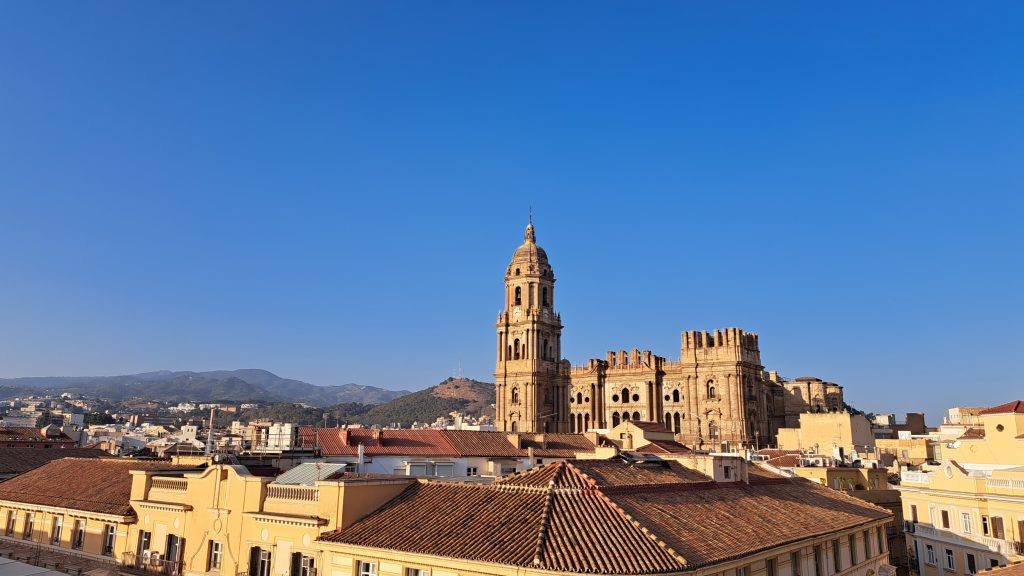
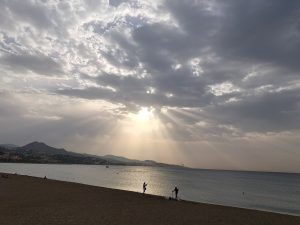 I recently utilized the Spanish healthcare system and had blood and urine analyses done. Todo bien. Everything within normal levels with a few things slightly above normal. Like Vitamin D. The doctor asked if I took vitamins. I hadn’t for months, not since I ran out of my multivitamin and fish oil tablets soon after arriving in Spain. “Oh, then, there’s nothing to worry about,” she said, “Your Vitamin D levels are from the sun.” Wow, okay. It’s not as if I spend large amounts of time in the sun. It’s just that the sun is out there. Every day. Everywhere. Okay, I exaggerate. Some mornings there are clouds, blessed clouds.
I recently utilized the Spanish healthcare system and had blood and urine analyses done. Todo bien. Everything within normal levels with a few things slightly above normal. Like Vitamin D. The doctor asked if I took vitamins. I hadn’t for months, not since I ran out of my multivitamin and fish oil tablets soon after arriving in Spain. “Oh, then, there’s nothing to worry about,” she said, “Your Vitamin D levels are from the sun.” Wow, okay. It’s not as if I spend large amounts of time in the sun. It’s just that the sun is out there. Every day. Everywhere. Okay, I exaggerate. Some mornings there are clouds, blessed clouds.
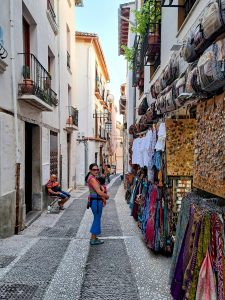 It’s summer and it’s hot in Málaga, though its location on the coast and the Mediterranean breeze surely makes it more bearable than inland Andalucian cities such as Sevilla, Córdoba, and Granada. We were in Granada in late June and the first two days of July with our daughter and one-year-old granddaughter who were visiting from New York. The afternoons were sweltering and for good reason the streets were mostly empty and only a few shops, mostly tourist focused, were open. We sought shade wherever we walked, which was challenging at peak afternoon, and we gratefully plopped ourselves in outdoor cafes equipped with misters that periodically whooshed reviving sprays of cool water at our wilting selves. It was a relief to return to the more tolerable heat of the coast.
It’s summer and it’s hot in Málaga, though its location on the coast and the Mediterranean breeze surely makes it more bearable than inland Andalucian cities such as Sevilla, Córdoba, and Granada. We were in Granada in late June and the first two days of July with our daughter and one-year-old granddaughter who were visiting from New York. The afternoons were sweltering and for good reason the streets were mostly empty and only a few shops, mostly tourist focused, were open. We sought shade wherever we walked, which was challenging at peak afternoon, and we gratefully plopped ourselves in outdoor cafes equipped with misters that periodically whooshed reviving sprays of cool water at our wilting selves. It was a relief to return to the more tolerable heat of the coast.
Across Calle Larios, Málaga’s main street in the Centro Histórico, awnings have been hung between the tops of buildings to provide shade along the length of this busy promenade. If we venture out in the middle of the day beyond Calle Larios, we know which streets provide even a little bit of shade. We have found a canopied café near the ruins of the Roman theater where a breeze blows through the short and narrow street. In that oasis, I sip a delicious limonada casera con hierbabuena while husband James opts for a clara.
In the evenings, I have switched from reading in the cathedral garden to sitting near the big fountain in the spacious Plaza de la Marina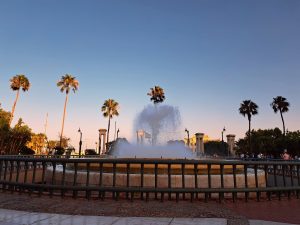 to better avail myself of the breeze coming off the water. Some evenings, I’ll walk to the beach, a moderate activity that will still generate sweat, but wading in the water even just to my shins is an immediate refresher and a great way to watch the day wane. Another beautiful day lived in Spain.
to better avail myself of the breeze coming off the water. Some evenings, I’ll walk to the beach, a moderate activity that will still generate sweat, but wading in the water even just to my shins is an immediate refresher and a great way to watch the day wane. Another beautiful day lived in Spain.
There isn’t a day that I don’t feel happy here. The city is lovely and full of history, and the people are friendly and kind. And yet, I do wonder how I and Americans, in general, are viewed by the locals. Seattle artist and poet Alan Lau sent me a video made by American YouTuber Nathaniel Drew who has lived in Europe for several years and who speaks excellent French. He interviewed Europeans on their thoughts about Americans. Here’s a sampling of their responses:
“a bit stupid.”
“they’re overrated.”
“The US is dangerous and they don’t care about their citizens.”
“a bit backwards.”
Here’s the link if you want to see and hear for yourself.
No Spaniards appeared in that video so I found one that just focused on their opinions. Their responses are similar to those in the other video. They agree that Americans are friendly but don’t know much about other countries. Also, one woman advises America to get rid of the guns and McDonalds.
As I make Spain my home, I’m aware that I’m an outsider. I want to be respectful and knowledgeable about the city and country where I live. I want to understand Spaniards not just as a people but as individuals, and that one-to-one contact requires that I reach a comfortable level of fluency in Spanish. I wish that could happen overnight, but of course, it’s a process. One that involves daily mistakes, which is part of the learning and generally will cause no harm. For example, don’t worry if you mean to ask for té de menta (mint tea) but instead ask for té de mente (mind tea – surely it exists!), you’ll still get mint tea.
I take opportunities to practice my Spanish wherever they arise even when I am a disappointment to the other party. When I went to the centro comercial to meet with (Spanish-speaking) friends, upon entering the complex, I was immediately approached by a young woman at a cosmetics kiosk. I knew her intent was to sell me something, yet she was so friendly and ready to engage and I had a few minutes to kill and why not practice my Spanish. Small talk first, like where we each were from. She was from Ceuta, the Spanish city on the north coast of Africa. Then she asked me about my skincare routine. Then she talked about my pores. Then she was applying some sort of gel to half my face. When she wiped it off, she told me to compare how each side of my face felt. It felt like one side of my face had just been wiped free of gel, but I agreed with her when she said, “se siente más suave.” She told me I only needed to apply it once a week. I asked her how much it cost. 150 euros. “Lo siento, no puedo,” I said, and in my head formulated the unspoken apology: Y lamento haberte hablado solo para practicar mi español.
Recently I met a neighbor I had not seen before on my floor. We were riding the elevator down together and discussing the weather. Before I get too far into a conversation in Spanish with someone, I let it be known that I’m still learning the language. This way, when I get stumped by something said to me or if I stumble badly in forming a response, ya he explicado mi falta de fluidez. When I delivered my todavia-estoy-aprendiendo-Espanol line to the woman in the elevator, she replied that she teaches Spanish. Que casualidad! There was a mutual delight in this discovery. Her job is actually in Bilbao in the north of Spain so she only lives part of the time in Málaga. I asked her about the differences between the two cities. Bilbao wins in gastronomy, but Málaga in almost every other category. We also talked a little bit about the regional differences in accents and pronunciation, because honestly when I eavesdrop on conversations in cafes or on the bus, there’s so much that escapes my understanding because of the tendency of Andalucians to drop the ends of words or even letters in the middle of words. Then as we were at the front door about to part ways, she suggested that we meet sometime for coffee so I can practice my Spanish. Genial! But wait, we then walked in opposite directions without exchanging numbers. Later I left a note for her with my phone number with the concierge, and now we are connected or as she put it, localizadas.
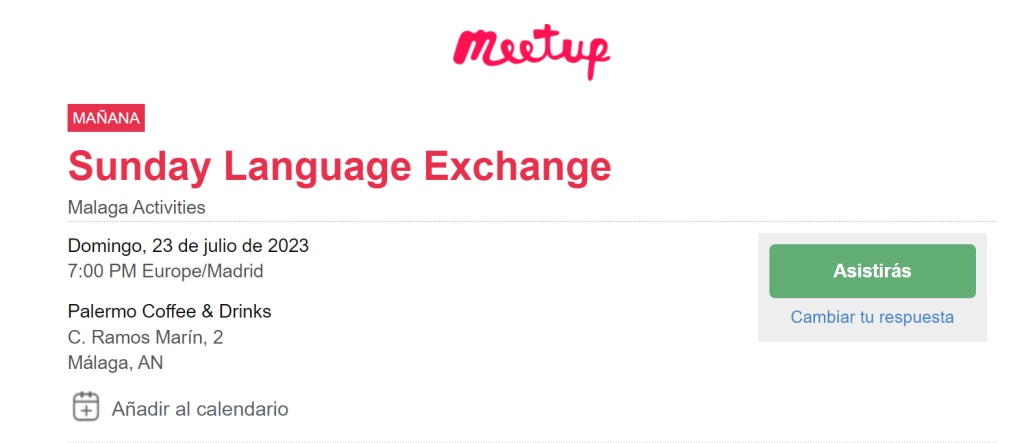
I attended my first intercambio de idiomas, or language exchange, where Spanish learners come to practice Spanish, and Spanish speakers come to practice English. The Spaniards already spoke excellent English, the Italian’s Spanish was fluent, the Serb who also spoke and taught German had taught himself Spanish, and while the German woman was just beginning to learn Spanish, she, like many Europeans, was fluent in English. So everyone was either bi- or multilingual, which made me feel sorely inadequate, though I did understand most of the conversation in Spanish and did not hesitate to practice speaking. Among the Spaniards was a Madrileño who also knew French and Italian and could imitate American and British accents. When he said my accent in Spanish was good, it was reassuring. It was a fun couple of hours and I intend to go again. And rather than feel daunted by the fact that these people are already well-versed in more than one language, I will instead be inspired by their example. ¡Adelante!
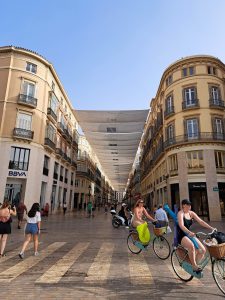
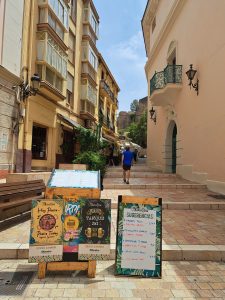
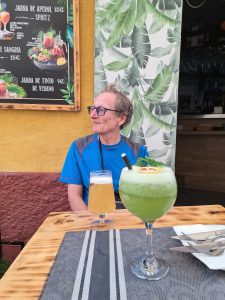

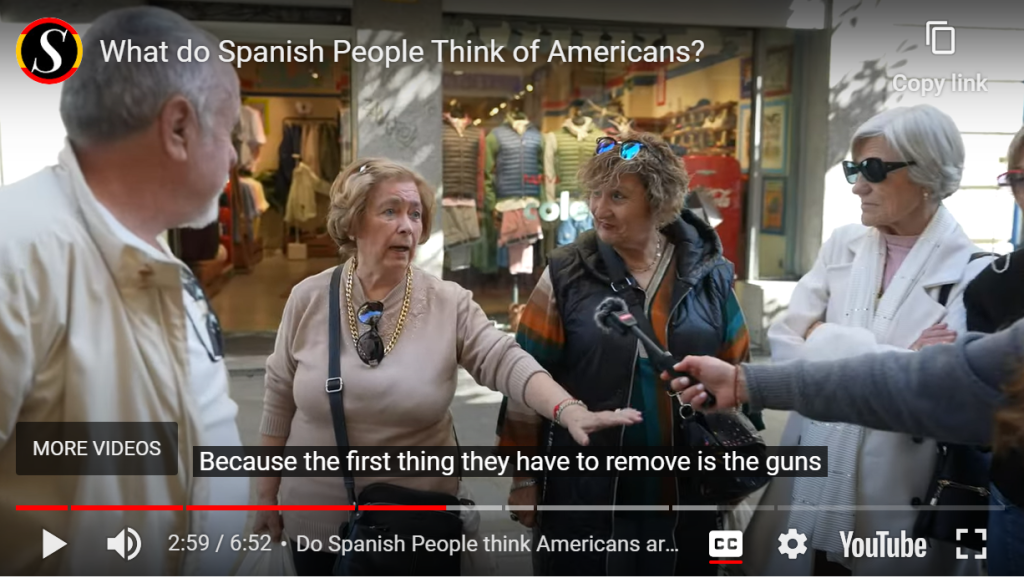
donna- i admire your moxy and open, adventuresome spirit in moving to and learning a new culture and language at your age. although my wife is japanese and i have visited many times and people ask me why don’t i move there and live, i have always hesitated. i think every foreigner comes to that point when they are in a another country when they come to the point of “put up or shut up”. in other words, you either buckle down and learn the language so you can at least communicate with the locals or forever be a tourist. i remember once being in a japanese market and seeing an older american guy who obviously had been living in japan for a while. he was trying to buy some fruit and he couldn’t even communicate to the vendor so he had to say “two” with two fingers in the air as a gesture. i promised myself that i never wanted to be like that guy. so while i enjoy my brief stays in japan i think i could never move there permanently and not learn proper japanese. as it is i speak enough of the language to get in trouble but not enough to get out of trouble if you know what i mean. locals often get excited to hear a few words in their native language and assume you are fluent so you may often say one sentence and they hit you with a barrage of sentences and then you are lost. at any rate, it’s great that you are jumping into the swimming pool and slowly immersing yourself in the cultural/lingistic waters. my hat’s off to you. cheers and stay cool! alan on phinney
Thanks, Alan. I know what you mean about people assuming you are fluent in their language because you’ve spoken a few sentences. I was in the elevator the other evening with a young man and I asked him if he was still working since it was after hours. He replied and spoke so quickly I didn’t catch what he said. But then he said something else which I did understand and we were back on track. But, yes, I’m still often in the stumbling, bumbling stage of communication but I try to do it with grace, if that’s not too much of an oxymoronic concept. I guess mostly I try to shrug off the mistakes. And while I’ll always be an outsider, I do want to function and participate in the everyday life and language of this city. Thanks for reading the blog!
I love reading how you are thriving in Malaga, Donna! You inspire me to be more bold in practicing my meager Spanish and anemic French when I have the opportunity.
Thanks, Elizabeth! Well, you inspire me to one day give French a try.
Brava.
Gracias!
What an experience you are having , fully immersing in the everyday life …
And you’re immersed in travel, which I hope to do as well in the near future!